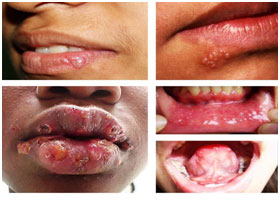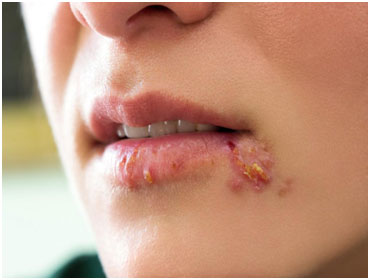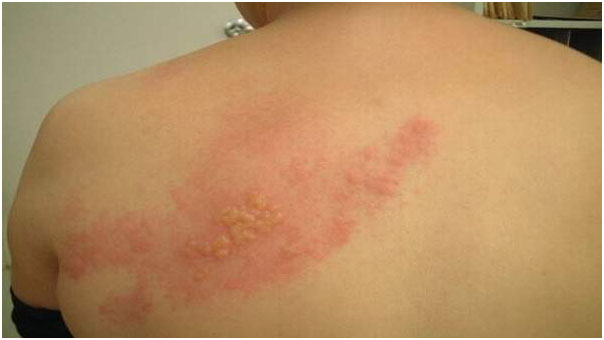Herpes
What is herpes?
Herpes is a common virus that causes sores on your genitals and/or mouth. Herpes can be annoying and painful, but it usually doesn't lead to serious health problems.

Herpes is a common infection.
Herpes is a super-common infection that stays in your body for life. More than half of Americans have oral herpes, and about 1 out of 6 Americans has genital herpes. So chances are a few people you know are living with herpes.
Herpes is caused by two different but similar viruses: herpes simplex virus type 1 (HSV-1) and herpes simplex virus type 2 (HSV-2). Both kinds can make sores pop up on and around your vulva, vagina, cervix, anus, penis, scrotum, butt, inner thighs, lips, mouth, throat, and rarely, your eyes. Herpes is spread from skin-to-skin contact with infected areas, often during vaginal sex, oral sex, anal sex, and kissing. Herpes causes outbreaks of itchy, painful blisters or sores that come and go. Many people with herpes don't notice the sores or mistake them for something else, so they might not know they're infected. You can spread herpes even when you don't have any sores or symptoms.
There's no cure for herpes, but medication can ease your symptoms and lower your chances of giving the virus to other people. And the good news is, outbreaks usually become less frequent over time, and even though herpes can sometimes be uncomfortable and painful, it's not dangerous. People with herpes have relationships, have sex, and live perfectly healthy lives.
What's the difference between genital herpes and oral herpes?

Because there are 2 different kinds of herpes simplex viruses (HSV-1 and HSV-2) that can live on many body parts, lots of people are confused about what to call these infections. But it's actually pretty simple:
- When you get either HSV-1 or HSV-2 on or around your genitals (vulva, vagina, cervix, anus, penis, scrotum, butt, inner thighs), it's called genital herpes.
- When you get either HSV-1 or HSV-2 in or around your lips, mouth, and throat, it's called oral herpes. Oral herpes sores are sometimes called cold sores or fever blisters.
HSV-1 usually causes oral herpes, and HSV-2 usually causes genital herpes - each strain prefers to live on its favorite area. But it's totally possible for both types of herpes simplex to infect either area. For example, you can get HSV-1 on your genitals if someone with a cold sore on their lips gives you oral sex. And you can get HSV-2 in your mouth if you give oral sex to someone with HSV-2 on their genitals.
How do you get herpes?
Herpes is easily spread from skin-to-skin contact with someone who has the virus. You can get it when your genitals and/or mouth touch their genitals and/or mouth - usually during oral, anal, and vaginal sex.
Herpes can be passed even if the penis or tongue doesn't go all the way in the vagina, anus, or mouth. You don't have to cum to spread herpes. All it takes is some quick skin-to-skin touching. You can also get herpes from kissing someone who has oral herpes.
The skin on your genitals, mouth, and eyes can be infected easily. Other areas of skin may get infected if there's a way for the herpes virus to get in, like through a cut, burn, rash, or other sores. You don't have to have sex to get herpes. Sometimes herpes can be passed in non-sexual ways, like if a parent with a cold sore gives you a peck on the lips. Most people with oral herpes got it when they were kids. A mother can pass genital herpes to a baby during vaginal childbirth, but that's pretty rare.
You can spread herpes to other parts of your body if you touch a herpes sore and then touch your mouth, genitals, or eyes without washing your hands first. You can also pass herpes to someone else this way.
Herpes is most contagious when sores are open and wet, because fluid from herpes blisters easily spreads the virus. But herpes can also "shed" and get passed to others when there are no sores and your skin looks totally normal.
Most people get herpes from someone who doesn't have any sores. It may live in your body for years without causing any symptoms, so it's really hard to know for sure when and how you got it. That's why so many people have herpes - it's a pretty sneaky infection.
Because the virus dies quickly outside the body, you can't get herpes from hugging, holding hands, coughing, sneezing, or sitting on toilet seats.
Fast facts about herpes:
- There are two types of herpes simplex viruses: HSV-1 (herpes type 1, or oral herpes) and HSV-2 (herpes type 2, or genital herpes).
- More than 50 percent of people in the United States have HSV-1.
- Around 15.5 percent of people in the U.S. aged 14-49 have HSV-2.
- Receiving oral sex from somebody who has cold sores around their mouth significantly raises the risk of becoming infected.
- It is impossible to get genital herpes from a toilet seat.
Symptoms

Most people do not experience symptoms for months or years after becoming infected. Those who do have symptoms during the initial period will usually notice them about 4 days after exposure (the average range is 2-12 days).
Many people with HSV have recurring herpes. When a person is first infected, the recurrences tend to happen more frequently. Over time, however, the remission periods get longer, and each occurrence tends to become less severe.
Primary infection symptoms
Primary infection is a term used for an outbreak of genital herpes that occurs when a person is first infected. The symptoms can be quite severe and may include:
- blisters and ulceration on external genitalia, in the vagina, or on the cervix
- vaginal discharge
- pain and itching
- tender, enlarged lymph nodes
- pain when urinating
- high temperature (fever)
- malaise (feeling unwell)
- cold sores around the mouth
- red blisters on the skin
In most cases, the ulcers will heal, and the individual will not have any lasting scars.
Recurrent infection symptoms
Symptoms that occur in a recurrent infection tend to be less severe and do not last as long as they do in the primary infection stage. Typically, symptoms will last no more than 10 days and include:
- burning or tingling around genitals before blisters appear
- women may have blisters and ulceration on the cervix
- cold sores around the mouth
- red blisters
Eventually, recurrences happen less often and are much less severe.
Causes

When HSV is present on the surface of the skin of an infected person, it can easily be passed on to someone else through the moist skin that lines the mouth, anus, and genitals. The virus may also spread to another individual through other areas of skin, as well as the eyes.
A human cannot become infected with HSV by touching an object, work surface, washbasin, or towel that has been touched by an infected person.
Infection can occur in the following ways:
- having unprotected vaginal or anal sex
- having oral sex with a person who gets cold sores
- sharing sex toys
- having genital contact with an infected person
The virus is most likely to be passed on just before the blister appears, when it is visible, and until the blister is completely healed. HSV can still be transmitted to another person when there are no signs of an outbreak, although it is less likely.
If a mother with genital herpes has sores while giving birth, it is possible that the infection will be passed on to the baby.
Prevention tips
To reduce the risk of developing or passing on genital herpes:
- use condoms when having sex
- do not have sex while symptoms are present (genital, anal, or skin-to-skin)
- do not kiss when there is a cold sore around the mouth
- do not have many sexual partners
Some people find that stress, being tired, illness, friction against the skin, or sunbathing may trigger recurrences of symptoms. Identifying and avoiding these triggers may help reduce the number of recurrences.
Nomination form for 2022 Global Awards :
https://www.unaniherbal.org/nomination-form.php
For more information you can also follow us on:

 If you wish to cancel your subscription to this newsletter click here
© Copyright 2014 Unani Herbal
If you wish to cancel your subscription to this newsletter click here
© Copyright 2014 Unani Herbal

